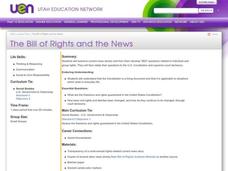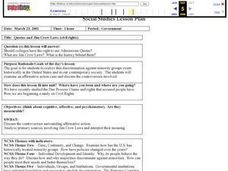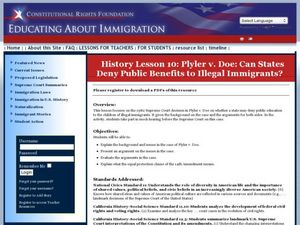Curated OER
Fugitive from Labor Cases:
High schoolers examine the cases of Henry Garnett and Moses Honner, both of the 1850s. Students analyze the political climate building up to the Civil War through the lens of these similar cases with different outcomes.
Curated OER
Change: Just a Matter of Time
Learners analyze the Declaration of Independence and primary sources to explain civil rights. Then, students write a Declaration of Change to express the grievances of African Americans, and their desire to participate fully in the...
Southern Nevada Regional Professional Development Program
Was Bias A Factor? Make an Argument
The ability to analyze an argument is a skill emphasized by the Common Core standards. Offer your class an opportunity to develop and hone their skills by providing them the testimonies in an Oregon court case. After reading the facts of...
Teaching Tolerance
Understanding the Prison Label
Break the chain. An engaging lesson examines why it is so hard to break free of the prison system in the US. Academics participate in a reader's theater, read primary sources, and discuss their thoughts. The lesson explains the hardships...
Facing History and Ourselves
Taking Ownership of the Law
The work of building and maintaining a democracy is, in the words of Justice William Hastie, "never finished." To better understand what Hastie sees as an ongoing building process, class members listen to a seven-minute podcast about two...
Constitutional Rights Foundation
Plyler v. Doe: Can States Deny Public Benefits to Illegal Immigrants?
Illegal immigration is an ever-changing source of consistent controversy. A reading passage about the rights of undocumented workers and illegal immigrants—and the lack thereof—guides high schoolers into a mock trial activity. Three...
Curated OER
The Bill Of Rights And The News
Students investigate the concepts related to the Bill Of Rights. They conduct research using a variety of resources and focus upon the human rights provided in the legislation. Students read a news article and reflect the upon the...
Curated OER
Right of Privacy: 4th Amendment
Students are introduced to the 4th Amendment of the Washington state Constitution. In groups, they examine the Constitution of the state of Washington and compare it to the United States Constitution. They role play the role Supreme...
Curated OER
Individual Rights -- Freedom of Speech at School
Learners examine their individual rights at a public school. In groups, they identify the most common ways of expressing themselves and why they should limit their speech in public. They compare and contrast two cases in which they...
Curated OER
Government
Students evaluate how the United States government has maintained a balance between protecting rights and maintaining order. They analyze the impact of Supreme Court decisions on governmental powers and the rights and responsibilities of...
Curated OER
Segregation in Prince Edward County
Eleventh graders examine the history of integration as it applied to Virginia high school in Prince Edward County. They evaluate a map of Virginia counties, read and analyze a first person narrative of a young girl involved in a boycott...
Curated OER
Making Democracy Work for Everyone, 1877-1904
Learners investigate the culture of the post Reconstruction South. They participate in a jigsaw research activity, conduct Internet research on an assigned topic, and write a report to present to the class.
Curated OER
The ADA, the Supreme Court, and Self-Advocacy
Young scholars study the role the Supreme Court plays in laws and decisions that affect individuals with disabilities and examine the policies of the American with Disabilities Act. They draw parallels between policies enacted by the...
Curated OER
Do We Need a Permanenet International Criminal Court?: War Crimes, Violence, International Law and Politics, Nuremberg
In this lesson, students explore the history, relevance and current application of international tribunals for war crimes. Students look at cases from the Nuremberg trials, Tokyo trials and the Bosnian War.
Curated OER
The Bill of Rights and the News
Students examine current news stories and from them develop "BIG" questions related to individual and group rights. They then relate their questions to the U.S. Constitution and supreme court decisions.
Curated OER
Quotas and Jim Crow Laws
Young scholars examine the use of quotas and Jim Crow laws. They discuss discrimination against minority groups both historically and in contemporary society. Students examine an affirmative action case and discuss the controversies...
Curated OER
History Lesson 10: Plyler v. Doe: Can States Deny Public Benefits to Illegal Immigrants?
Young scholars consider the rights of illegal immigrants. In this illegal immigration lesson, students analyze the Supreme Court case Plyler v. Doe and determine whether illegal immigrants should have access to public benefits. Young...
Curated OER
Japanese Internment
Eleventh graders read about and discuss the Japanese Internment of World War II. In this Japanese Internment lesson, 11th graders examine the Japanese Internment. They talk about the civil rights aspect, how they would deal with being...
Smithsonian Institution
Re-Segregation of American Schools: Re-Segregation
Examine the re-segregation of public schools in a thought-provoking resource. Young scholars read articles and primary sources, complete worksheets, and watch a video to explore the idea that desegregation made schools more segregated....
Curated OER
Thurgood Marshall Makes a Difference
Pupils find information about the life and legal career of Thurgood Marshall, including the NAACP and its causes. They comprehend the issues and context of the Brown v. Board of Education case that Marshall argued before the U.S. Supreme...
Judicial Branch of California
Separate But Equal - Is It Black or White?
The story of Ruby Bridges and the case of Brown vs. The Board of Education are fantastic tools for discussing the concept of separate but equal. Kids tackle some big questions about what is fair, what is civil, and what rights or laws...
Curated OER
Government Lesson Plan: Lesson Plan 8
Students analyze the Fourteenth Amendment. They discuss Reconstruction, read the provisions of the Fourteenth Amendment, define the provisions, and in small groups analyze a Supreme Court case that was impacted by the due process clause.
Curated OER
Reconstruction (1865–1877)
In this online interactive history activity, students respond to 7 short answer and essay questions about the causes and effects of Reconstruction following the American Civil War.
Curated OER
Equal Protection Questions
In this Supreme Court worksheet, students respond to 14 short answer questions regarding equal protection and gay marriage issues in the United States.

























